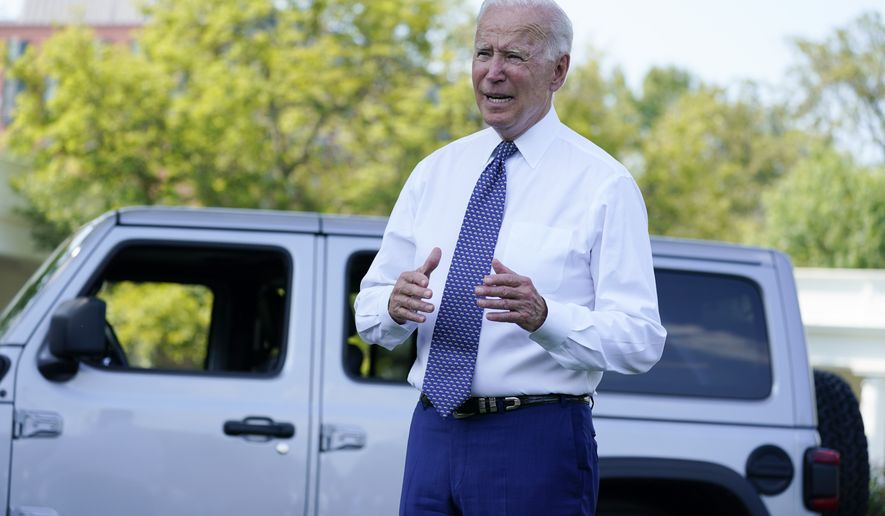President Biden on Thursday proposed the most sweeping overhaul of the auto industry in U.S. history, announcing a slew of wide-ranging regulations and goals to increase gasoline mileage, reduce pollution and shift toward electric vehicles.
Mr. Biden signed an executive order mandating that 50% of all vehicles sold in the U.S. be electric by 2030. Also Thursday, the Environmental Protection Agency and the Transportation Department announced requirements to limit greenhouse gas emissions and raise vehicle mileage through model year 2026.
The agencies said they were reversing President Trump’s rollback of fuel emission standards.
Flanked by leaders from auto companies and labor unions at a White House event, Mr. Biden hailed electric cars as the industry’s future.
“There is no turning back,” Mr. Biden said. “The question is whether we lead or fall back in the race for the future.”
He said the executive order would provide good-paying union jobs that would sustain the middle class.
The move was the Biden administration’s most far-reaching to date to combat climate change, but it opened him to criticism from the right and left.
Conservatives say electric vehicles are too expensive, with the average cost to replace a battery exceeding $5,000. They also accuse the administration of making the U.S. more reliant on China, the world’s largest manufacturer of electric car batteries.
“Biden’s plan to mandate electric vehicles, as well as wind and solar, will make us even more dependent on our No. 1 global adversary, China,” said Steve Milloy, a member of the Trump/Pence transition team. He called the proposals “a policy of national suicide.”
Climate activists, however, say the president isn’t going far enough to cut vehicle emissions. The transportation sector is the largest producer of greenhouse gases in the U.S.
Transportation in 2019 accounted for 29% of U.S. greenhouse gas emissions, which contribute to global warming. Mr. Biden campaigned on cutting the emissions in half by 2030.
“President Biden has called global warming an existential threat, but these standards won’t protect us,” said a statement by Dan Becker, director of the Safe Climate Transport Campaign at the Center for Biological Diversity. “The only reason automakers have ever cut pollution is because strong rules forced them to. And these rules won’t.”
Perhaps the biggest obstacle to Mr. Biden’s goal is the free market. Electric vehicles account for just 2% of new vehicle sales in the U.S. because consumers still prefer gasoline power.
“The proposal does little to incentivize a switch by consumers,” said Ashley Nunes, the project director of competition policy for the R Street Institute, a free market think tank. “Instead, it indirectly presents consumers with more electric cars to choose from. Yet studies show that consumers just aren’t that enthused by going electric compared to the status quo.”
Another challenge to manufacturers and consumers is shifting away from gas-powered engines. Electric vehicles have fewer components, requiring fewer assembly line workers, but consumers would need to spend thousands of dollars to set up charging stations in their garages to keep their automobiles powered.
“Infrastructure can be the bottleneck in the EV adoption process. The relation between electric vehicle adoption and infrastructure development presents the classic chicken-or-the-egg dilemma,” said Hang Ren, a business professor at George Mason University.
“Consumers may hesitate to buy an EV unless they feel the charging infrastructure is available. At the same time, companies or local authorities may not be willing to invest in this infrastructure unless they feel the sales of EVs will justify its cost.”
To alleviate those concerns, U.S. automakers have called on Mr. Biden and Congress to spend more on electric vehicle infrastructure and to add incentives in the president’s upcoming spending bill. They are calling for a larger network of electric vehicle charging stations and purchasing incentives for consumers.
The bipartisan infrastructure plan currently allocates $7.5 billion for placing roughly 250,000 vehicle chargers along U.S. roads. Mr. Biden initially called for 500,000 recharging stations.
Charging spots that already dot America’s roadways have received mixed reviews. Consumers complain that recharging takes too long and the stations are often out of commission.
“A busted charging station is arguably worse than no charger at all. Currently, depending on where you go, it’s a hit or miss,” Mr. Nunes said. “Some stations are busted, some have a queue and others charge fees that are less than transparent.”
Still, representatives from the three largest automakers made it clear that they stand with the White House on increasing electric vehicle production. In a joint statement, Ford, General Motors and Stellantis, the parent company of Chrysler, welcomed Mr. Biden’s proposals.
“We look forward to working with the Biden administration, Congress, and state and local governments to enact policies that will enable these ambitious objectives,” the traditional Big Three automakers said.
The United Auto Workers union also said it supported the administration’s goals.
“Today’s announcement on emissions standards brings more certainty and better planning for the auto industry and UAW member future jobs,” UAW President Ray Curry said in a statement.
The EPA and Transportation Department are proposing more stringent emissions standards, exceeding the strident goals established during the Obama era.
Under the new standards, light-duty vehicles would be required to reduce emissions by 10% by model year 2023, which would include cars sold next year. By model year 2026, the standards would be even more stringent. The agencies have yet to announce their target.
The agencies also aim to increase fuel efficiency to 54.5 miles per gallon by model year 2026.
Mr. Trump said the move to roll back President Obama’s fuel efficiency standards, which Republicans hailed at the time as his largest deregulatory action, would save automakers more than $100 billion in compliance costs.
The Biden administration expects its actions to conserve about 200 billion gallons of gasoline and prevent roughly 2 billion metric tons of carbon pollution.
—
Corrected from an earlier version which had an incorrect honorific for Mr. Ashley Nunes.
• Jeff Mordock can be reached at jmordock@washingtontimes.com.




Please read our comment policy before commenting.